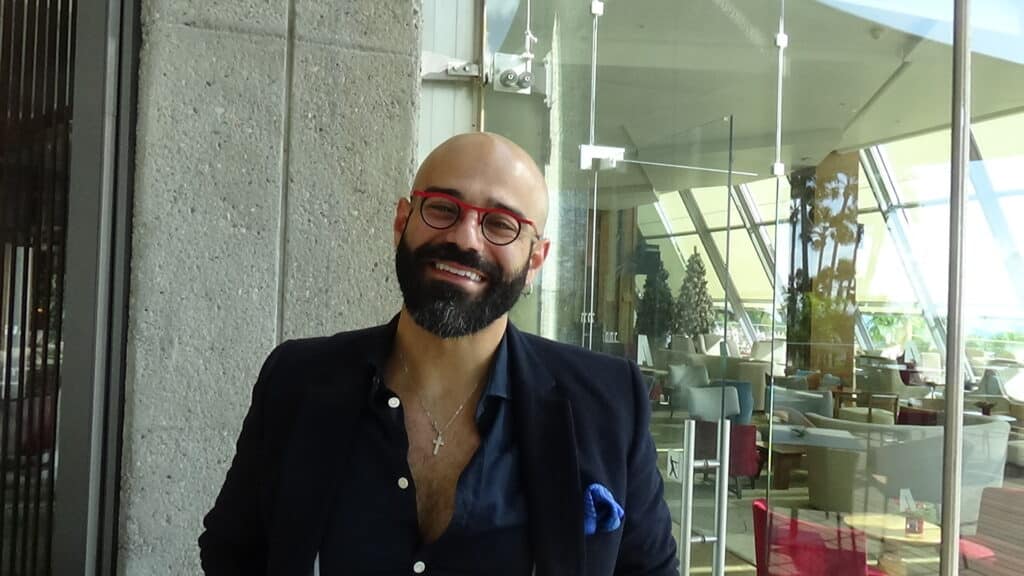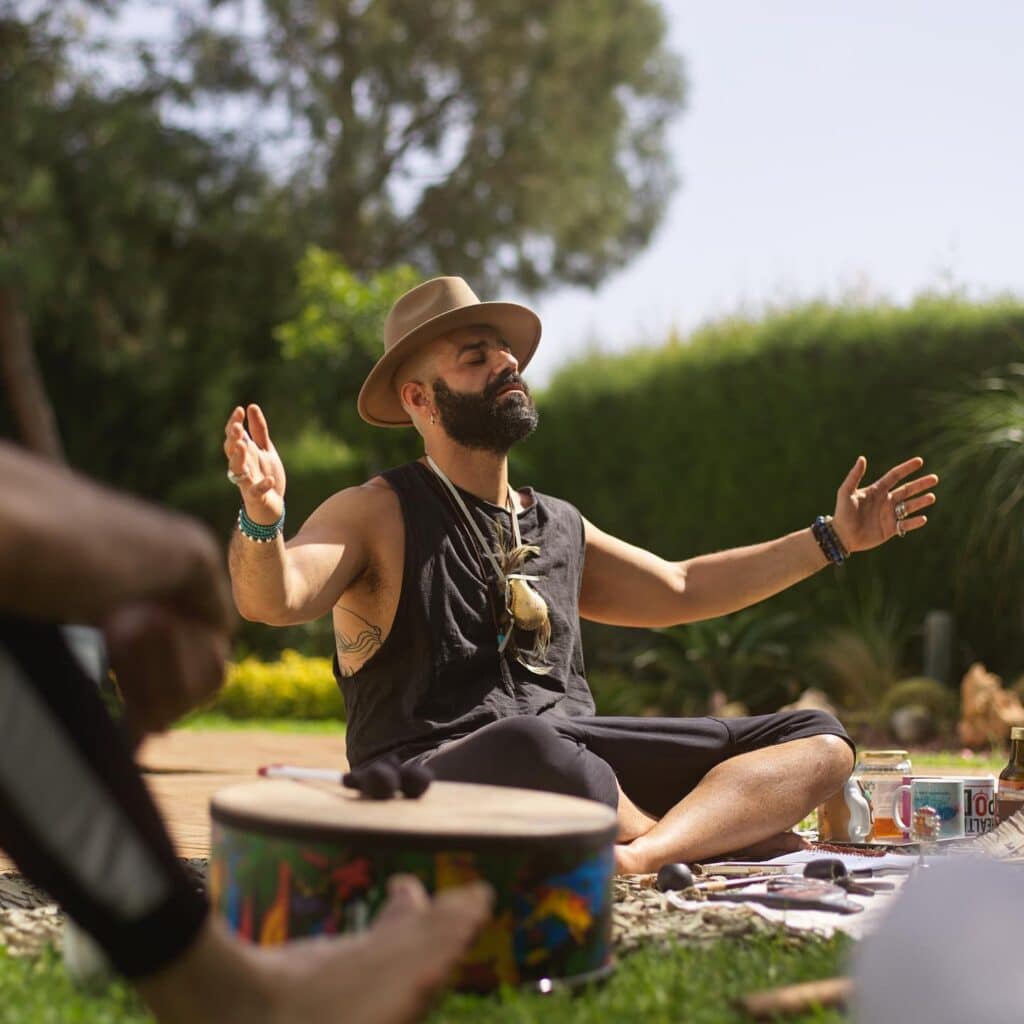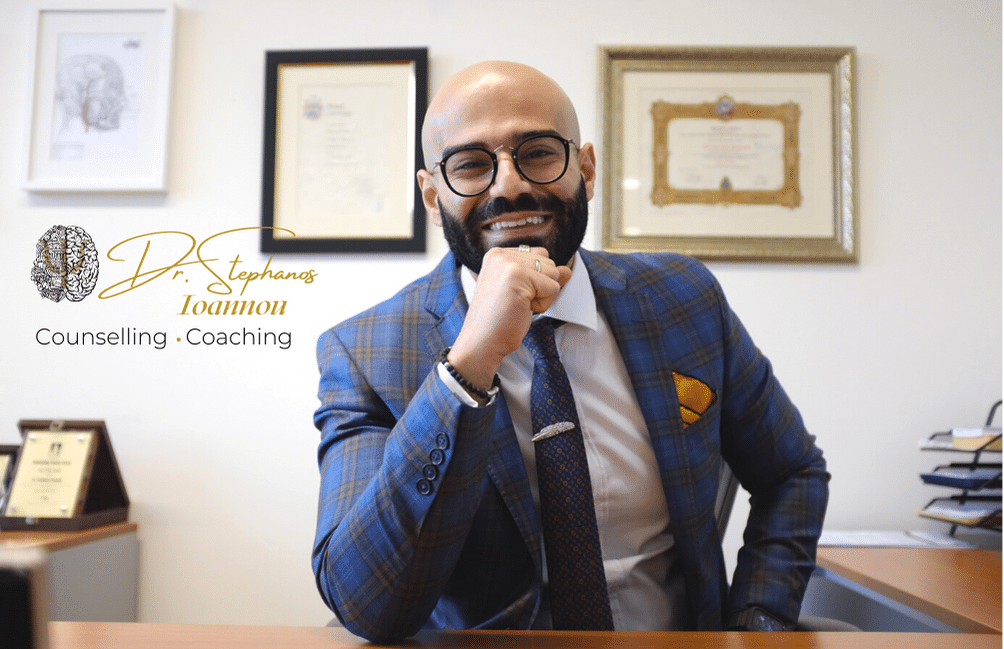From a child who was never heard, to a young ‘asshole’, to wearing many emotional hats, one alternative doctor is fearless. THEO PANAYIDES meets him
Where to begin? Most of his clients at the Limassol Psychological Wellbeing Centre come complaining of stress and anxiety, says Dr Stephanos Ioannou – but we kick off the interview by discussing nutrition and sleep patterns, and he’s also a psychophysiologist, meaning he studies emotional states as reflected in physical symptoms.
Then again, his stall at the recent Mind Body & Spirit exhibition was called Love Unmasked: Controversial Truths About Modern Relationships. He’s a psychoanalyst and relationship counsellor – but he also does bio-hacking and thermal imaging, indeed “I’m considered one of the fathers of thermal imaging”. He can talk trauma and supplements with equal ease, and did his PhD (at the University of Parma) in neuroscience, on the peripheral vascular system. He has views on lithium batteries, gay adoption and society losing its values. ‘What exactly do you do?’ I ask in desperation, and he nods thoughtfully: “Truth be told, I could wear a lot of hats…”
A hat is pretty much the only thing he’s not wearing, looking quite distinctive as we sit sipping coffee and nibbling delicious petit-fours at the Amathus Beach, down the road from his office. He wears earrings, suspenders, and glasses with colourful red frames. There’s a blue handkerchief in his lapel pocket, a cross round his neck, and assorted beads and bracelets on his wrists. His head is shaven, his beard neatly trimmed, his top two shirt buttons casually undone. None of this is irrelevant, both because appearance is part of the persona (there’s always a persona) and because it reinforces his status as a cool, silver-tongued, somewhat alternative doctor – a non-medical doctor who has his own podcast (Health Pod on YouTube) and uses his Instagram (drstephanos_neuroscientist) to post both ‘anti-stress hacks’ and romantic love poems to his wife Hélène.

Does he mean it literally, in his case?
“Literally, yes. I had addictions. Before I met my wife, I used to indulge a lot in alcohol, marijuana, women. I was a womaniser.” A man with maternal trauma didn’t get enough love from his mother as a child – “not because she was a bad mum, but because she was working a lot of hours” – and spends his life seeking validation from the opposite sex; a woman with paternal trauma, similarly, will seek the approval of men, jumping from relationship to relationship.
Then again, “if you have paternal trauma as a man, then you are avoidant towards other men… Because I don’t feel safe in my masculinity, I don’t feel safe in approaching other men”. Stephanos had paternal trauma too – not anymore: his dad is “a great man, we have a beautiful relationship” – and had mostly girls as friends (though not actual girlfriends) as a teen. Even now, he has few alpha males in his close circle.
Again, none of this is irrelevant – especially since, as he puts it, “my trauma has made me the man that I am today”. Both his parents were teachers; he has two siblings, 10 and nine years older. Growing up, their problems always seemed more important than his own. “I was the youngest, so I was the child that was never heard” – a child who was “managed,” as he puts it (‘Go to your room’, ‘Go away now, I’m working’), who never felt “seen”. His abiding memory is of loneliness, isolation, “depression, self-harm”, being bullied at school. He was also a very late bloomer – “I went through puberty, I think, at the age of 20!” – leaving only a small window for his various addictions to explode before meeting the woman of his life.
“Going to university,” he admits (he studied Psychology at Leicester), “was not about getting the grades, or attending classes – it was all about how to build my persona. My persona was acting on my behalf, I was not acting on my persona – so my persona was controlling me… My trauma was guiding me.”
What was the persona?
“The persona was this person that is loud, confident, extrovert, nice body – so that I was able to attract, abuse emotionally, and never create healthy relationships with women.”
So he was the villain, in those years?
“The asshole, yeah.”
All this is divulged without bitterness or embarrassment; indeed, says Stephanos, “it’s essential for any adult to do the work on themselves, to understand ‘Where the hell am I in my own personal development?’” – otherwise you just end up passing on your hang-ups to your kids (he has two, aged six and three). The various testimonials on his website (drstephanosioannou.com) talk of everyday problems – insomnia, panic attacks, eating disorders – and most people, as already mentioned, come to him for stress and anxiety; stress is the bedrock of unhappiness, since it creates “this tunnel vision where a lot of people ignore what is going well in their life”. Stress and anxiety, however, “for me as a therapist is child’s play… The juice of a person has to do with ‘What is your trauma? How can I get to know you better? How can I support you?’”.
Indeed, he can usually treat things like panic attacks without even doing much therapy; people look at him disbelievingly when he says he can cure them in five sessions, “but I’ve seen this with over 600 clients of mine”. He’ll “physiologically optimise them first,” he explains. “We control the cortisol curve, we intervene at crucial points… and then we start building up the nervous system through supplements and exercises, to create an armour for panic attacks and anxiety”. (Most doctors still don’t believe that supplements work, I point out. “Of course. How are the pharmaceutical industries going to make money?”) That’s just basic neurophysiology, though – not the deep dive where people look within, talk about their relationships, then “cry on my couch to release, to mourn the death of [their] old self”. Not “the good work”, as he calls it.
“It takes a very brave soul to kind of dig deeper into their shadows. Because there you’re going to realise ‘Oh shit, I was never loved as a child’. ‘Oh, my dad was never present for me.’ ‘Actually there’s nothing wrong with me, this is the way I’ve been programmed – so how can I re-programme myself, and how can I remember to be human again?’ And this is the essence of psychoanalysis and psychotherapy.”
Therapy is nothing new, of course, ditto all the ‘inner child’ business. What’s unusual about Dr Stephanos is that his approach is holistic, all-embracing. It’s there in the way he talks – endlessly, garrulously, seguing from one subject to another, showing off his knowledge of all kinds of things – and it’s there, for instance, when he mentions that “occasionally, if I’m lucky, I might get a patient that is bipolar. I consider them a huge asset because the conversations I have with them – or schizophrenics – are so intense and enlightening”. Simply put, he’s fearless: unembarrassed by his own past, unfazed by the various excesses of the human psyche, open to all forms of therapy, from cutting-edge solutions to ancient knowledge of herbs and spices.
He’ll advise making a turmeric latte after work, for instance (as opposed to watching TV or going to the gym), adding nutmeg “which is a natural sedative” and honey to raise your insulin, “which is a cortisol suppressant”. But then he’s also involved in thermal imaging, a photo with a “very expensive” camera that can detect physiological – and emotional – problems by looking at the infra-red light we emit. (How mainstream is this? “It’s not,” he replies simply.) He’s had experience with psychedelics, like mushrooms and ayahuasca, as a possible treatment for depression – “It can truly shift huge chunks of trauma” – and believes that “medicine is moving that way now”. He’s enthused by AI, and what it can do: “Your phones in the future are going to tell you ‘OK, now you’re stressed. Stand up. Walk. Stretch. Have this supplement. You’re feeling low, your heart rate is dropping…’”. But then he also harks back to pre-scientific days, and the old belief in higher forces: “I mean, it’s great that we speak about the box of science and psychology, but beyond this there’s the box – actually it’s not just a box, it’s the universe of spirituality”.
Don’t be fooled by the cross around my neck, chuckles Stephanos: “I believe in God, but I don’t believe in the dogmas”. His spirituality is free-floating, a question of positive energies and Jungian synchronicities. That said, however, “I wish that all people would go to church… Because church is the social glue of society”; the result of systematically shunning all religion is that “slowly you will degrade as a person,” he believes. He himself, admittedly, is no churchgoer – “but I pray on a daily basis. I meditate, I do my practices”.
His morning routine is impressive, especially for a dad of two young kids – though in fact he doesn’t see the kids till breakfast, “if I see my kids in the morning, I’m destroyed”. He does see them later, of course, he’ll drive them to school and they all sing together, “I hug them, I empower them” – but those first 45 minutes of the day are another matter: “That’s [just] me. It’s non-negotiable”.

It’s not what he does per se, it’s the fact that he does it. The Limassol Psychological Wellbeing Centre is a relatively new development, having been open for two years (before that he spent six years in Saudi Arabia, as Assistant Professor of Physiology at Alfaisal University) – but the fervent desire for improvement has always been there in Dr Stephanos Ioannou, from his lost and lonely childhood to the evil little window when his addictions took over (he knew it was wrong: “I was praying for a woman that I had no excuse to cheat on”, then he met Hélène), to the many years since when he’s worked at his traumas and relationships, and tried to find ways to access the circuitous path to happiness.
“You need to hack your biology to be happy,” he explains, incidentally answering the eternal question why something so vital should be so elusive. “It’s not in our biology to be happy. In our biology is to be angry, sad, hungry… But the human being has changed over the years, and our biology has not adapted to that.”
The answer, I suppose, is that we just have to keep working at happiness – whether through cortisol and serotonin, or therapy, or romantic love, or bio-hacking, or thermal imaging, or being spiritual, or just being open. “By exposing your vulnerabilities, you’re exposing a bigger spectrum of your soul,” he says, “and that’s where human connections are made”. It’s unclear how many close friends Stephanos has (I suspect he’s too intense and wide-ranging to find many kindred spirits), and his hobbies, though admirably random, are all somewhat solitary – he writes poetry, plays the flute, goes spear-fishing, likes to paint little Warhammer mini-figures – yet human connection is important to him, not just as a therapist with clients but out in the world. “I’m an extrovert, for sure!… I’m genuinely interested in people.”
Even that, in its way, is self-improvement: “What can I learn from the person sitting opposite me, that I will find a missing fragment of my soul?” is what he tells himself when approaching a new acquaintance, an admission that friendship is essentially egotistical. The (inner) child is father to the man – and children are famously self-centred, it’s only natural. But children also feel, and that’s the crux of it. “Your mind is the worst place to be,” says Dr Stephanos. “And the longest distance that we cover as people is from our mind to our heart. That might never happen for some people. But this” – he taps his chest – “is where we want to be. In the heart!” The secret of wellbeing, and just being.







Click here to change your cookie preferences